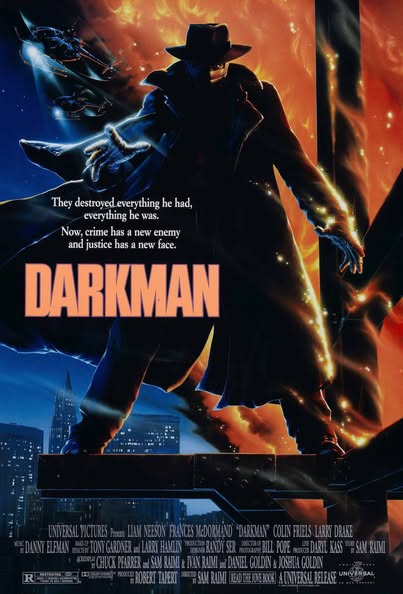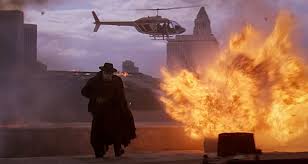Darkman (1990)

Darkman (1990) is a unique blend of action, horror, and superhero elements that showcases the creative vision of director Sam Raimi. This film marks a significant departure from traditional superhero narratives, introducing audiences to a complex character battling both external and internal demons. With its stylistic flair, dark humor, and innovative special effects, Darkman has garnered a cult following and remains a standout entry in the genre.
The story follows Dr. Peyton Westlake, portrayed by Liam Neeson, a brilliant scientist who is on the verge of perfecting a synthetic skin that could revolutionize the field of medicine. However, his life takes a tragic turn when he becomes the target of a ruthless crime lord and his henchmen. After a brutal attack that leaves him disfigured and presumed dead, Westlake embarks on a quest for vengeance, adopting the alter ego of Darkman. This transformation not only highlights his physical changes but also reflects the psychological turmoil he experiences as he grapples with loss, anger, and a desire for justice.
Darkman is notable for its exploration of themes such as identity, revenge, and the human condition. As Westlake dons different faces using his synthetic skin, he delves into the complexities of identity and the masks people wear in their daily lives. This motif resonates throughout the film, as Westlake confronts not only his enemies but also his own sense of self. The film raises poignant questions about the nature of humanity, particularly in the face of trauma and loss. This deeper philosophical undercurrent distinguishes Darkman from typical superhero films, inviting viewers to reflect on the moral implications of Westlake’s actions.

The film’s visual style is a hallmark of Raimi’s direction. Known for his inventive camera work and dynamic storytelling, Raimi employs a range of techniques that enhance the film’s dark and surreal atmosphere. The use of dramatic lighting, shadowy settings, and quick cuts creates a sense of urgency and tension, immersing viewers in Westlake’s chaotic world. The special effects, particularly the transformations and action sequences, are both innovative and memorable, contributing to the film’s lasting appeal. The blend of practical effects and early CGI techniques showcases the creativity of the filmmakers, setting a precedent for future superhero films.

Liam Neeson delivers a powerful performance as Peyton Westlake, capturing the character’s vulnerability and inner strength. His portrayal of Darkman balances rage and compassion, making the character relatable despite his extraordinary circumstances. The supporting cast, including Frances McDormand as Westlake’s love interest, Julie Hastings, and Larry Drake as the menacing villain, adds depth to the narrative. McDormand’s performance brings a sense of humanity to the story, grounding the fantastical elements in real emotions. The interactions between the characters highlight the personal stakes involved in Westlake’s quest for justice.
The film also features a memorable score by Danny Elfman, whose signature style complements the film’s tone. The music enhances the emotional weight of key moments, reinforcing the tension and urgency of Westlake’s journey. Elfman’s score, combined with Raimi’s visual storytelling, creates an immersive experience that captivates audiences from start to finish.

While Darkman incorporates elements of horror and action, it also infuses dark humor that sets it apart from other films in the genre. Raimi’s signature comedic touches provide moments of levity, balancing the film’s darker themes and making it accessible to a wider audience. This interplay between humor and horror contributes to the film’s unique identity, allowing it to transcend conventional genre boundaries.
In conclusion, Darkman is a captivating film that masterfully blends action, horror, and psychological depth. Sam Raimi’s innovative direction, combined with Liam Neeson’s compelling performance and a strong supporting cast, creates a rich narrative that resonates with viewers. The film’s exploration of identity, revenge, and the human condition sets it apart from traditional superhero stories, making it a thought-provoking and entertaining experience. With its stylish visuals, memorable score, and engaging themes, Darkman remains a significant and influential entry in the realm of genre cinema, leaving a lasting impact on audiences and paving the way for future explorations of complex characters in the superhero landscape.











